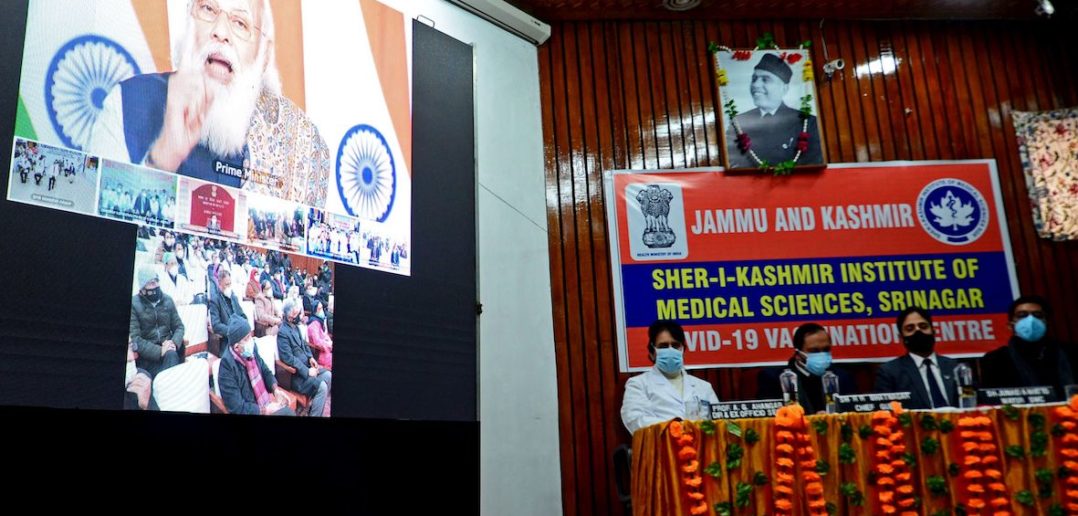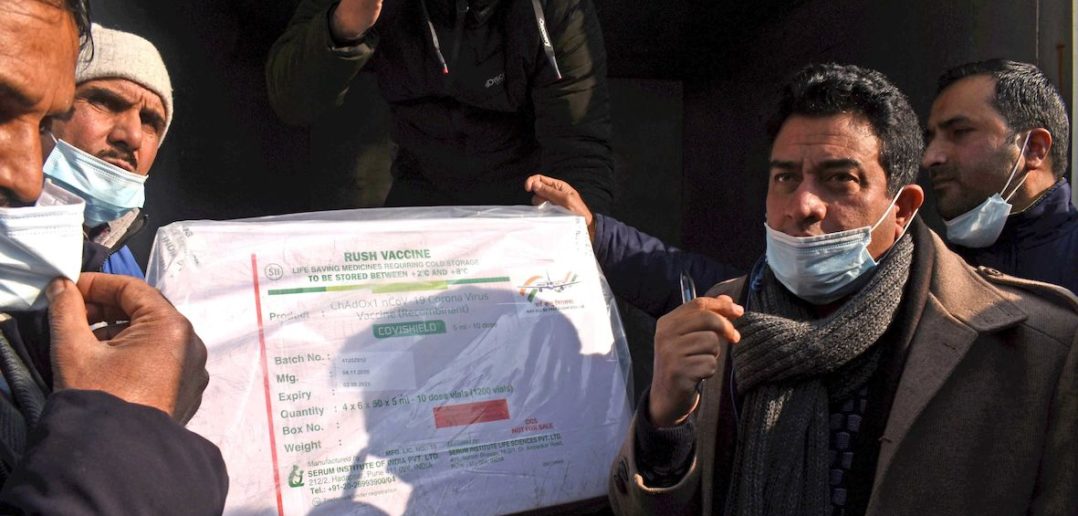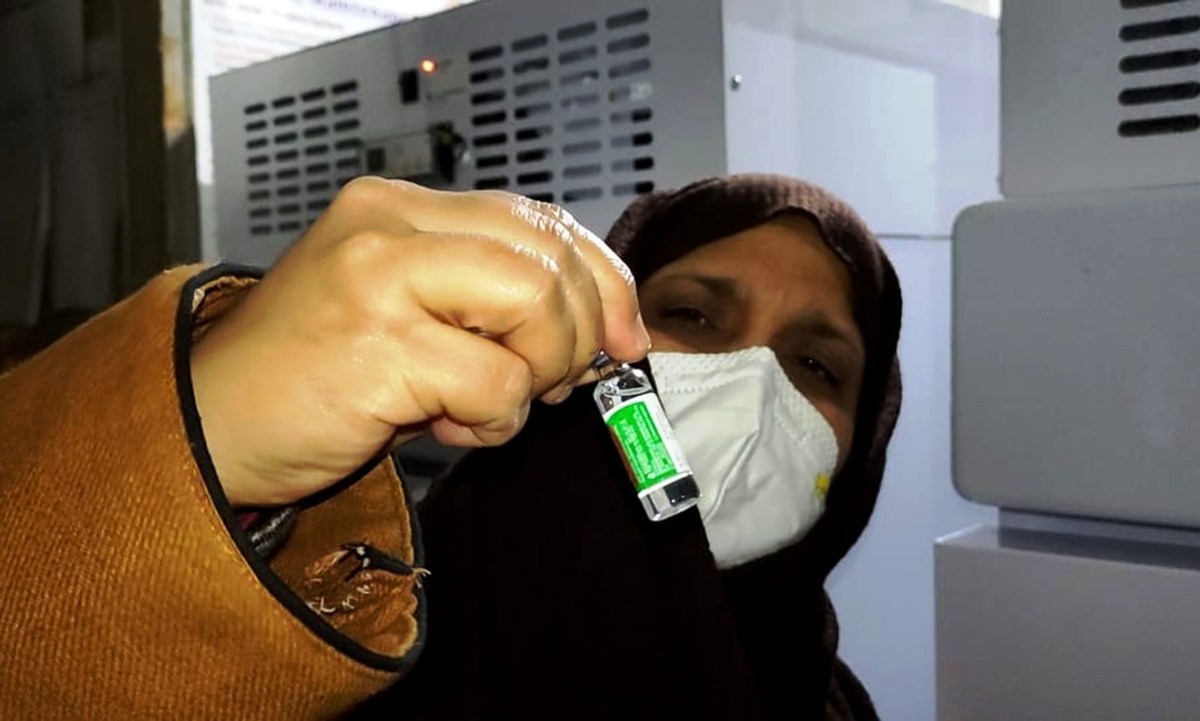As Covid-19 vaccination gathers pace in Kashmir, a section of people are sounding cautious not knowing that sixty per cent of vaccines consumed globally are made in India, reports Saima Bhat

On January 16, Dr Ahmad (wishing to identify his second name only) was ready for a hectic day at his hospital, which was selected for vaccination. Most of his colleagues were going to receive the shot.
The syringe was loaded, the camera was ready to freeze the moment and everyone seemed happy. But it was then that Dr Ahmad, who was in-charge on the day, was surprised to see everyone talking in hushed tones at his back. He sensed that the health officials were hesitant about taking the vaccine.
Dr Ahmad took the lead and got himself vaccinated. He thought his decision would boost the morale of his colleagues but still there were only a few takers.
Dr Ahmad had contracted the Coronavirus infection in August. He isolated himself immediately and managed his mild symptoms at home. But a day after getting vaccinated Dr Ahmad developed symptoms like fever, cold, body ache and breathlessness which were severe than the Covid itself.
“I was very much apprehensive that I may need hospitalisation but after a week, I started improving and I am doing good now,” he said.
Even after his recovery, one of his colleagues, Dr Sheena (name changed), who had also contracted the virus last year, spoke about her apprehensions and said that the vaccines are being made available too early and no one knows their effectiveness in the long run.
“We have studied that it takes years to test vaccines but in the case of Coronavirus, it came in the market within a year after the pandemic struck. How can we be sure about its efficacy? I personally feel that it is better to follow norms of social distancing than getting vaccinated at an early-stage,” she said.
In Jammu and Kashmir, the immunisation for COVID-19 was started on January 16, 2020. The health workers including doctors, paramedics and other hospital staff will get the vaccine in the first step under a voluntary basis.
“We have a target of 1.07 lakh health workers in the first stage. So far, we have immunized 22000 workers. They will be given a second dose after 28 days,” said Dr Qazi Haroon, the state immunisation officer. He added that in the second session other frontline workers, including Police, Army, SMC and revenue officials will receive their doses.

The immunisation was started after India’s drug regulator gave the green light to Covishield (the local name for the Oxford-AstraZeneca vaccine developed in the UK) and Covaxin, locally made by pharma company Bharat Biotech.
How does the vaccine work?
Covaxin is an inactivated vaccine which means that it is made up of killed coronaviruses. Bharat Biotech used a sample of the coronavirus, isolated by India’s National Institute of Virology. When administered, immune cells can still recognise the dead virus, prompting the immune system to make antibodies against the pandemic virus. The two doses of Covaxin are given four weeks apart. The vaccine can be stored at 2to 8 degree celsius.
While Covishield, manufactured by the Serum Institute of India, is made from a weakened version of a common cold virus (known as an adenovirus) from chimpanzees, it has been modified to look more like Coronavirus, although it can’t cause illness. The jab is administered in two doses given between four and 12 weeks apart. It can be safely stored at temperatures of 2 to 8 degree Celsius.
The Controversy
The Indian company Bharat Biotech partnered with the National Institute of Virology and the Indian Council of Medical Research to develop an inactivated Coronavirus vaccine called Covaxin. The government of India authorised the vaccine for emergency use on January 3, despite the lack of published Phase 3 data showing the vaccine is safe and effective, reported The New York Times.
The controversy began when the regulator said the vaccine had been approved for “restricted use in emergency situations in public interest as an abundant precaution, in clinical trial mode, especially in the context of infection by mutant strains”.
The New York Times reported in another report that, “Neither Covaxin’s manufacturer, Bharat Biotech, nor the Indian Council of Medical Research, which contributed to the vaccine’s development, has published data proving that it works. In a Covaxin consent form at District Hospital Aundh, one of a handful of sites in Pune where the vaccine was being administered, the manufacturer noted that clinical efficacy was “yet to be established.”
While quoting experts the BBC also reported it is said that there were “intense concerns arising from the absence of the efficacy data”.
In the meantime, the Bharat Biotech manufacturer listed out the factors that need to be taken care of before getting the jab. People with weak immune systems, serious medical condition, pregnant mothers, and those allergic to vaccine ingredients should not take it.
There were, however, many reports in India about many doctors at various hospitals in Mumbai and Delhi preferring Covaxin than Covishield.
But the government has said that the people became apprehensive because of the adverse events following immunisation (AEFI) that were reported from New Delhi on day one.
The Kashmir Scene

Back in Kashmir, the people had high hopes that the vaccines from Moderna and Pfizer, both manufactured overseas, will be available, said Dr Muhammad Salim Khan, the head of the Social and Preventive Medicines at government medical college in Srinagar.
“Instead two vaccines were made available and both are made in India. The problem is the vaccine was still going under trials in phase three. We should have waited for phase 4, where we would have got to know the efficacy and its safety profile,” Dr Khan said. He added that the vaccine is given under clinical trials, where people have to fill a consent form before going for the vaccination.
Dr Khan has himself received the first jab of the vaccine and luckily he did not develop any symptoms. He later recorded a video for social media where he appealed his colleagues to go for vaccination.
But Dr Khan does not know for how long after the vaccination he will be safe from contracting the virus. “I can’t say that. We don’t have any literature available so far,” he said.
“There is a misconception about the quality of vaccines. Almost 65 per cent vaccines that are consumed in developing countries worldwide are being produced by India.” Dr Khan said. “Initially we used to see parents spending thousands for getting their kids immunised but all of those immunisations are now being done free of cost and all of them are made in India. Their safety profile is good.”
Reportedly in the Bijbehara area, around 100 health workers were supposed to get the vaccine each at Government Medical College and Sub-District Hospital Bijbehara respectively. “Out of 100, only 29 health workers were administered vaccines at Sub-District Hospital Bijbehara. Out of them, only 6 were doctors,” reported a local wire agency on January 16.
Response

From January 16 to 29, immunisation was done for six days where around 22000 health care workers were given the Covishield jabs. The immunisation officer for the state claims in the following 15 days they will vaccinate 1.07 lakh health workers.
“The trust has been developed and people are coming forward,” said, Dr Haroon.
He believes it is always better to get vaccinated rather than not getting it. “People are happy everywhere and taking the vaccine but I don’t know why it is a problem here only. Around 25 lakh people have been vaccinated so far. If there is no quality check, do you think the government of India would have approved the vaccine?”
Meanwhile, the Indian Express reported a survey done by GOQii COVID-19 – The Way Forward. The survey done before the rollout of vaccines in India showed more than 50 per cent of India’s population expressing caution towards taking the vaccine.
A similar kind of survey was carried out in Kashmir by Dr Naveed Shah, professor and head of Pulmonary Medicine, GMC Srinagar. It asked 41 questions. But so far, the results of the survey have not been published.
But Dr Shah told Kashmir Life that preliminary report suggests that “around 60 per cent of Kashmir population is reluctant to go for vaccination.”
As this report is being filed, The scroll.in reported on January 28 that, “nine deaths of health workers has been reported from Uttar Pradesh, Karnataka, Andhra Pradesh, Rajasthan, Telangana, Gurugram and Odisha, following the administration of the vaccine in the 12 days since the start of the immunisation programme on January 16….The six men and three women who died were between 27 and 56 years old. The deaths took place between 24 hours and five days after taking the vaccines and all have been ascribed to cardiovascular problems or “brain stroke”.
The vaccine taken in each case was Covishield….In each case, the government has stated that the death was not due to the vaccine but has not revealed who made that determination and the details of the investigation.”















